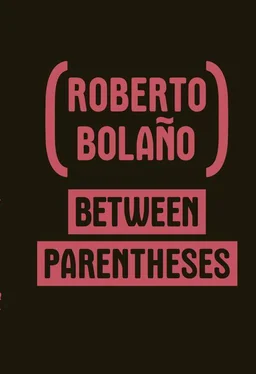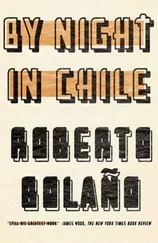Roberto Bolaño - Between Parentheses - Essays, Articles and Speeches, 1998-2003
Здесь есть возможность читать онлайн «Roberto Bolaño - Between Parentheses - Essays, Articles and Speeches, 1998-2003» весь текст электронной книги совершенно бесплатно (целиком полную версию без сокращений). В некоторых случаях можно слушать аудио, скачать через торрент в формате fb2 и присутствует краткое содержание. Год выпуска: 2011, Издательство: New Directions, Жанр: Публицистика, Критика, на английском языке. Описание произведения, (предисловие) а так же отзывы посетителей доступны на портале библиотеки ЛибКат.
- Название:Between Parentheses: Essays, Articles and Speeches, 1998-2003
- Автор:
- Издательство:New Directions
- Жанр:
- Год:2011
- ISBN:нет данных
- Рейтинг книги:4 / 5. Голосов: 1
-
Избранное:Добавить в избранное
- Отзывы:
-
Ваша оценка:
- 80
- 1
- 2
- 3
- 4
- 5
Between Parentheses: Essays, Articles and Speeches, 1998-2003: краткое содержание, описание и аннотация
Предлагаем к чтению аннотацию, описание, краткое содержание или предисловие (зависит от того, что написал сам автор книги «Between Parentheses: Essays, Articles and Speeches, 1998-2003»). Если вы не нашли необходимую информацию о книге — напишите в комментариях, мы постараемся отыскать её.
The Savage Detectives
Between Parenthese
Between Parentheses: Essays, Articles and Speeches, 1998-2003 — читать онлайн бесплатно полную книгу (весь текст) целиком
Ниже представлен текст книги, разбитый по страницам. Система сохранения места последней прочитанной страницы, позволяет с удобством читать онлайн бесплатно книгу «Between Parentheses: Essays, Articles and Speeches, 1998-2003», без необходимости каждый раз заново искать на чём Вы остановились. Поставьте закладку, и сможете в любой момент перейти на страницу, на которой закончили чтение.
Интервал:
Закладка:
Enrique Vila-Matas told me a story. A while ago he attended a conference on exile. The participants were Mario Benedetti, Cristina Peri Rossi, and Augusto Monterroso. Probably a few others, I don’t know. The point is that Benedetti and Peri Rossi talked about exile as something terrible, horrible, etc., and when it was Monterroso’s turn, he said that for him exile had been a delightful, happy experience. In other words, he was satisfied with everything that had happened to him during his long stay in Mexico. I wasn’t at this conference, and Vila-Matas didn’t say much else about it, but I’m absolutely in agreement with Monterroso’s account. In even the worst case, going into exile is better than needing to go into exile and not being able to. And exile, in most cases, is a voluntary decision. No one forced Thomas Mann to go into exile. No one forced James Joyce to go into exile. Back in Joyce’s day, the Irish probably couldn’t have cared less whether he stayed in Dublin or left, whether he became a priest or killed himself. In the best case, exile is a literary option, similar to the option of writing. No one forces you to write. The writer enters the labyrinth voluntarily — for many reasons, of course: because he doesn’t want to die, because he wants to be loved, etc. — but he isn’t forced into it. In the final instance he’s no more forced than a politician is forced into politics or a lawyer is forced into law school. With the great advantage for the writer that the lawyer or politician, outside his country of origin, tends to flounder like a fish out of water, at least for a while — whereas a writer outside his native country seems to grow wings. The same thing applies to other situations. What does a politician do in prison? What does a lawyer do in the hospital? Anything but work. What, on the other hand, does a writer do in prison or in the hospital? He works. Sometimes he even works a lot. (Not to mention poets.) Of course the claim can be made that in prison the libraries are no good and that in hospitals there often are no libraries. It can be argued that in most cases exile means the loss of the writer’s books, among other material losses, and in some cases even the loss of his papers, his unfinished manuscripts, projects, letters. It doesn’t matter. Better to lose manuscripts than to lose your life. In any case, the point is that the writer works wherever he is, even while he sleeps, which isn’t true of those in other professions. Actors, it can be said, are always working, but it isn’t the same: the writer writes and is conscious of writing, whereas the actor, under great duress, only howls. Policemen are always policemen, but that isn’t the same either, because it’s one thing to be and another to work . The writer is and works in any situation. The policeman only is. And the same is true of the professional assassin, the soldier, the banker. Whores, perhaps, come closest in the exercise of their profession to the practice of literature.
Archilochus, Greek poet of the seventh century BC, is a perfect example of this phenomenon. Born on the island of Paros, he was a mercenary, and, according to legend, he died in combat. We can imagine his life spent wandering the cities of Greece.
In one fragment, Archilochus doesn’t hesitate to admit that in the midst of battle, probably a skirmish, he drops his weapons and runs away, which for the Greeks was undoubtedly the greatest mark of shame, let alone for a soldier who has to earn his daily bread by his courage in combat. Archilochus says:
Some Saian mountaineer
Struts today with my shield.
I threw it down behind a bush and ran
When the fighting got hot.
Life seemed somehow more precious.
It was a beautiful shield.
I know where I can buy another
Exactly like it, just as round.‡
According to the classical scholar Carlos García Gual, Archilochus had to leave the island where he was born to earn a living with his lance, as a soldier of fortune: he knew war only as a toilsome chore, not as a field of heroic deeds. He won renown for his cynicism in a few lines of verse that tell how he flees the battlefield after he throws away his shield. His openness in confessing such a shameful act is striking. (In hoplite tactics, the shield is the weapon that protects the flank of the next soldier, symbol of courage, something never to be lost. “Return with the shield or on the shield,” it was said in Sparta.) All the pragmatic poet cared about was saving his own life. He cared nothing for glory or the code of honor.
Another fragment: “Hang iambics. / This is no time / for poetry.” And: “Father Zeus, / I’ve had / No wedding feast.” And: “His mane the infantry / cropped down to stubble.” And: “Balanced on the keen edge / Now of the wind’s sword, / Now of the wave’s blade.” And this, which could only have been written by someone buffeted by fate:
Attribute all to the gods.
They pick a man up,
Stretched on the black loam,
And set him on his two feet,
Firm, and then again
Shake solid men until
They fall backward
Into the worst of luck,
Wandering hungry,
Wild of mind.
And this, spotlessly cruel and clear:
Seven of the enemy
were cut down in that encounter
And a thousand of us,
mark you,
Ran them through.
And:
Soul, soul,
Torn by perplexity,
On your feet now!
Throw forward your chest
To the enemy;
Keep close in the attack;
Move back not an inch.
But never crow in victory,
Nor mope hangdog in loss.
Overdo neither sorrow nor joy:
A measured motion governs man.
And this, sad and pragmatic:
The heart of mortal man,
Glaukos, son of Leptines,
Is what Zeus makes it,
Day after day,
And what the world makes it,
That passes before our eyes.
And this, in which the human condition shines:
Hear me here,
Hugging your knees,
Hephaistos Lord.
My battle mate,
My good luck be;
That famous grace
Be my grace too.
And this, in which Archilochus gives us a portrait of himself and then vanishes into immortality, an immortality in which he didn’t happen to believe: “My ash spear is my barley bread, / My ash spear is my Ismarian wine. / I lean on my spear and drink.”
‡All translations from Archilochus are by Guy Davenport, from Archilochus, Sappho, Alkman: Three Lyric Poets of the Late Greek Bronze Age , U. Cal Press, 1980. — tr.
Fragments of a Return to the Native Land
THE INVITATION
Twenty days in Chile that shook the (mental) world that I inhabit. Twenty days that were like twenty sessions of humanity falling with a thud. Twenty days that would make anyone weep or roll on the floor laughing. But let’s start from the beginning. I left Chile in January 1974. The last time I flew anywhere was in 1977. I thought I’d never go back to Chile again. I thought I’d never get on a plane again. One day a girl called me from Paula Magazine and asked if I wanted to be on the jury for a story contest that the magazine organizes. Right away I said yes. I don’t know what I was thinking. Maybe I was thinking about the glorious sunsets of Los Angeles, though not the Los Ángeles of Bío-Bío, in Chile, but the Los Angeles of California, the sunsets of the city that sprang up from nothing and from whose rooftops you can see see the radiance that oozes from every inch of the planet. I might have been thinking about that. I might have been making love. Yes, now I remember, that was it. Then the phone rang and I got out of bed and answered and a female voice asked if I’d like to come to Chile and then the city of Los Angeles full of skyscrapers and palm trees became the city of Los Ángeles full of one-story buildings and dirt roads. Los Ángeles, the capital of the province of Bío-Bío, the city where Fernando Fernández played foosball in yards that were like something dreamed up by deranged adolescents, the city where Lebert and Cárcamo were constant companions and where tolerant Cárdenas was class president at a boys’ school designed by some petty demon and where El Pescado suddenly went underground. City of evening raids. Savage city whose sunsets were like the aphasic commentary of privilege. So I said yes in the same tone that I might have said no. The room was dark; I was expecting a phone call, but not this one; the voice that spoke to me from the other side of the world was sweet. At that moment I could have said no. But I said yes because like a mountain cat, the capital of the province of Bío-Bío suddenly leaped onto the map of the city of happiness and was clawing at it, and in those (invisible) claw marks it was written that I had to return to Chile and I had to get back on a plane.
Читать дальшеИнтервал:
Закладка:
Похожие книги на «Between Parentheses: Essays, Articles and Speeches, 1998-2003»
Представляем Вашему вниманию похожие книги на «Between Parentheses: Essays, Articles and Speeches, 1998-2003» списком для выбора. Мы отобрали схожую по названию и смыслу литературу в надежде предоставить читателям больше вариантов отыскать новые, интересные, ещё непрочитанные произведения.
Обсуждение, отзывы о книге «Between Parentheses: Essays, Articles and Speeches, 1998-2003» и просто собственные мнения читателей. Оставьте ваши комментарии, напишите, что Вы думаете о произведении, его смысле или главных героях. Укажите что конкретно понравилось, а что нет, и почему Вы так считаете.












